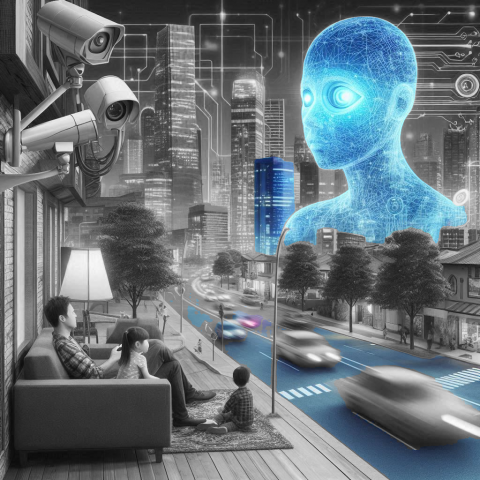
AI in Everyday Life: From Dazzle to Deep Surveillance
With Meta AI on WhatsApp, it seems now AI is visibly present in everyone's life who has access to a smartphone. However, the truth is, whether people have access to a smartphone or not, AI has access to everyone's life. For example, you cannot escape from the satellite's eyes, and people in cities often come under the scanner of one or another surveillance camera. AI has greater and deeper access to us than the access we have to AI. Like any technology, its usability and its ability to make life easier are significant. The ability to generate voice, text, and videos has astonished us. But what lies beyond the astonishment? Is the intention behind it as noble as it is presented? For instance, one of the biggest arguments in education is that AI will help personalize learning.
There is no doubt it's a very powerful tool, and it will help us do many things in a shorter period of time and perhaps more effectively. We should learn its uses, but we should not stop here. We also need to discover the larger socio-political and economic consequences it may lead to. At this point, the writer of the book “The Age of Surveillance Capitalism,” Shoshana Zuboff, writes that the plan is not to automate things around us but to automate us. Well, I am not trying to present a utopian fantasy or a dystopian nightmare about AI. In this article, I am simply arguing that as educators, we must engage with the sociology of artificial intelligence.
And once we engage with the sociology of artificial intelligence, a natural question arises, and here I quote from the book “The Age of Surveillance Capitalism”:
“Any consideration of the division of learning must resolve these dilemmas expressed in three essential questions. The first question is ‘Who knows?’ This is a question about the distribution of knowledge and whether one is included or excluded from the opportunity to learn. The second question is ‘Who decides?’ This is a question about authority: which people, institutions, or processes determine who is included in learning, what they are able to learn, and how they are able to act on their knowledge. What is the legitimate basis of that authority? The third question is ‘Who decides who decides?’ This is a question about power. What is the source of power that undergirds the authority to share or withhold knowledge?”
Most of us access AI tools to know about something, and the moment we ask something from AI tools, the question arises: who knows? And a step further: whose knowledge is this? And as given in the quote: who decides? The third question is even more important: who decides who decides?
As of now, the legitimate way of knowing was based on constitutional principles, and often the government elected through popular mandate used to have the ultimate authority to decide. But with the advent of joint technological companies with massive accumulation of capital, the final authority to decide appears to be shifting. India, a country of 1.4 billion people, is still struggling to touch the 5 trillion dollar mark of the economy, whereas the four companies, i.e., Amazon, Google, Meta, and Apple, have a cumulative capital of 7 trillion dollars. The massive wealth and disruptive technology give them power to operate beyond the laws. In this new and emerging world economic order, which Shoshana Zuboff has rightly named as surveillance capitalism, there is potential to build a totally new world. While we are dazzled by the capacity of technology to create things for us, what will this new world look like? We do not know. Let’s end with what Shoshana Zuboff writes:
“More than six hundred years ago, the printing press put the written word into the hands of ordinary people, rescuing the prayers, bypassing the priesthood, and delivering the opportunity for spiritual communion directly into the hands of the prayerful. We have come to take for granted that the internet enables an unparalleled diffusion of information, promising more knowledge for more people: a mighty democratizing force that exponentially realizes Gutenberg’s revolution in the lives of billions of individuals. But this grand achievement has blinded us to a different historical development, one that moves out of range and out of sight, designed to exclude, confuse, and obscure.”
For Further reading
- If...Then: Algorithmic Power and Politics by Taina Bucher
- The age of Surveillance Capitalism by Shoshana Zuboff
- https://www.youtube.com/watch?v=Le122vas9aM
- Log in to post comments
